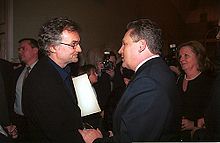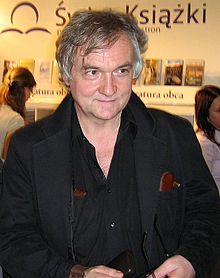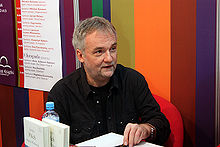- Jerzy Pilch
-
Jerzy Pilch (Polish pronunciation: [ˈjɛʐɨ ˈpilx]; born 10 August 1952 in Wisła, Poland) is one of the most important contemporary Polish writers and journalists. Critics have compared Pilch's style to Witold Gombrowicz, Milan Kundera, or Bohumil Hrabal.
 Jerzy Pilch (left) with president Aleksander Kwaśniewski
Jerzy Pilch (left) with president Aleksander Kwaśniewski
Born and raised in the small town of Wisła in the Beskids in southern Poland, Pilch studied Polish philology at the Jagiellonian University in Kraków and became active in the city's underground literary scene in the late 1970s. He began making his name under the martial law in the 1980s, by writing and reading essays for the "spoken magazine" Na Głos ("Out loud"), a regular spoken-word event organised by the oppositional Klub Inteligencji Katolickiej ("Club of Polish Catholic Intellectuals") (even though Pilch himself is Lutheran).
In 1989 Pilch began to contribute highly popular satirical essays for the Kraków-based liberal Catholic weekly Tygodnik Powszechny, which established him as a public intellectual. Pilch's best essays from his column in Tygodnik Powszechny appeared in three collections entitled Rozpacz z powodu utraty furmanki ("Despair caused by the loss of a wagon", 1994), Tezy o głupocie, piciu i umieraniu ("Theses on stupidity, drinking and dying", 1995), and Bezpowrotnie utracona leworęczność ("The irreversible loss of left-handedness", 1998).
Also in 1989, he was conferred the renowned Kościelski Award for his debut novel Wyznania twórcy pokątnej literatury erotycznej ("Confessions of an author of illicit erotic literature"), an ironic insider's account of the Kraków art scene.
Pilch's second novel, Spis cudzołożnic ("List of Adulteresses", 1993) , tells the story of a failed eccentric writer guiding a foreign guest on a tour of Kraków and through a curio collection of national myths and the absurd socialist realities of the 1980s. In 1995, actor Jerzy Stuhr made the novel into a film as his directing debut (under the international title List of Lovers).
The same year, Pilch published his third novel Inne rozkoszy ("Other pleasures"), the first to appear in English (as His Current Woman, 2002) (see external links).
Pilch quit his work for Tygodnik Powszechny in 1999, left the Kraków scene entirely, and settled down in Warsaw, where he began to write a column for the weekly Polityka. A collection of texts from this series was published as Upadek człowieka pod Dworcem Centralnym ("The Fall of Man in front of the Central Station") in 2002.
Pilch's most successful book so far is his fourth novel Pod Mocnym Aniołem ("The Strong Angel Inn", 2000), a satirical take on the "drinking novel" genre, which was awarded a NIKE, the most prestigious Polish literary award, the following year. In 2009, it was translated into English as The Mighty Angel, and in 2010, Tysiąc spokojnych miast was also translated as A Thousand Peaceful Cities.
Most recently, Pilch tried his hand at drama; the play Narty Ojca Świętego presents a small-town community excited by the rumour that John Paul II (who was still alive at the time) was going to retire to the town. The plot satirizes the Polish cult around John Paul II, the taboo to even think about the pope's death, as well as the commercialization of the pope's image.
Several of Pilch's books have been translated into various languages, including Bulgarian, Dutch, English, Estonian, French, Lithuanian, Russian, Slovak, and Spanish. Nonetheless, Pilch remains little known outside the circles of connoisseurs of East European literature.
Books
- 1988: Wyznania twórcy pokątnej literatury erotycznej, Kraków: Wydawnictwo Literackie. ISBN 83-08-03379-2 ("Confessions of an author of illicit erotic literature")
- 1993: Spis cudzołożnic. Proza podróżna, Kraków: Wydawnictwo Literackie. ISBN 83-08-03193-5 ("List of adulteresses. Travel prose"; screen version under the international title List of Lovers, 1995).
- 1994: Rozpacz z powodu utraty furmanki, Kraków: Wydawnictwo Literackie. ISBN 83-08-03457-8 ("Despair caused by the loss of a wagon")
- 1995: Inne rozkosze, Kraków: Wydawnictwo "a5". ISBN 83-85568-44-1 ("Other pleasures"; translated as His Current Woman, Evanston, Ill.: Northwestern University Press/Hydra Books 2002, ISBN 0-8101-1918-8).
- 1996: Monolog z lisiej jamy, Kraków: Universitas. ISBN 83-7052-365-X ("Monologue from a foxhole")
- 1997: Tezy o głupocie, piciu i umieraniu, Kraków: Wydawnictwo Literackie. ISBN 83-08-03424-1 ("Theses on stupidity, drinking and dying")
- 1997: Tysiąc spokojnych miast, Kraków: Wydawnictwo Literackie. ISBN 83-08-03243-5 ("Thousand silent cities"; translated as A Thousand Peaceful Cities, Rochester, NY: Open Letter Books 2010, ISBN 978-1934824276).
- 1998: Bezpowrotnie utracona leworęczność, Kraków: Wydawnictwo Literackie. ISBN 83-08-02909-4 ("The irreversible loss of left-handedness")
- 2000 (with Olga Tokarczuk and Andrzej Stasiuk): Opowieści wigilijne, Wałbrzych: Ruta. ISBN 83-912865-7-6 ("Christmas tales")
- 2000: Pod Mocnym Aniołem, Kraków: Wydawnictwo Literackie. ISBN 83-08-03072-6 ("The Strong Angel Inn"; translated as The Mighty Angel, Rochester, NY: Open Letter Books 2009, ISBN 978-1-934824-08-5).
- 2002: Upadek człowieka pod Dworcem Centralnym ("The Fall of Man in front of the Central Station")
- 2004: Miasto utrapienia, Warszawa: Wydawnictwo Świat Książki. ISBN 83-7391-370-X ("City of Woe")
- 2004: Narty Ojca Świętego, Warszawa: Wydawnictwo Świat Książki. ISBN 83-7391-728-4 ("The Holy Father's Skis")
- 2006: Moje pierwsze samobójstwo, Warszawa: Wydawnictwo Świat Książki. ISBN 83-247-0473-6 ("My First Suicide")
- 2007: Pociąg do życia wiecznego, Warszawa: Wydawnictwo Świat Książki
- 2008: Marsz Polonia, Warszawa: Wydawnictwo Świat Książki
External links
- Review of The Holy Father's Skis in The Daily Telegraph
- Pilch at culture.pl
- Excerpt from His Current Woman at polishwriting.net
- Jerzy Pilch at Open Letter Books
- Excerpt from The Mighty Angel at Open Letter Books
Categories: Polish writers | 1952 births | Living people | Lutheran writers | Alumni of Jagiellonian University | Polish Lutherans | People from Wisła | Nike Award winners
Wikimedia Foundation. 2010.


